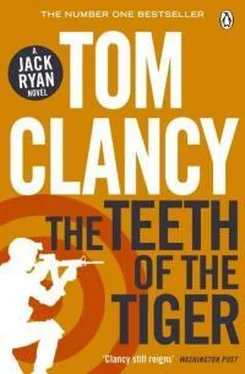“They must want our help very badly,” Ernesto observed.
“They have their own considerable resources, as they have demonstrated, jefe. But they seem to need some expertise for smuggling weapons in addition to people. In any case, they ask little, and they offer much.”
“And what they offer will make our business more convenient?” Ernesto wondered.
“It will certainly make the Yanquis devote their resources to different tasks.”
“It could create havoc in their country, but the political effects could be serious . . .”
“ Jefe, the pressure they put upon us now can scarcely get worse, can it?”
“This new norteamericano president is a fool, but dangerous even so.”
“And so, we can have our new friends distract him, jefe, ” Pablo pointed out. “We will not even use any of our assets to do so. We have little risk, and the potential reward is large, isn’t it?”
“I see that, but, Pablo, if it is traced to us, the cost could be serious.”
“That’s true, but again, how much additional pressure can they put on us?” Pablo asked. “They’re attacking our political allies through the Bogotá government, and if they succeed in producing the effect they desire then the harm to us will be very serious indeed. You and the other members of the Council might become fugitives in our own land,” the Cartel’s intelligence chief warned. He didn’t have to add that such an eventuality would take much of the fun out of the immense riches the Council members enjoyed. Money has little utility without a comfortable place to spend it. “There is an adage in that part of the world: The enemy of my enemy is my friend. Jefe, if there is a major downside to this proposal venture, I do not see it.”
“You think I should meet with this man, then?”
“ Sí, Ernesto. There should be no harm. He is more wanted by the gringos than we are. If we fear betrayal, then he should fear it even more so, shouldn’t he? And in any case, we will take proper precautions.”
“Very well, Pablo. I will discuss this with the Council with a recommendation that we hear him out,” Ernesto conceded. “How difficult would it be to set up?”
“I would expect him to fly through Buenos Aires. Surely he knows how to travel safely. He probably has more false passports than we do, and he truly does not look conspicuously Arabian.”
“His language skills?”
“Adequate,” Pablo answered. “Speaks English like an Englishman, and that is a passport all its own.”
“Through Greece, eh? Our product?”
“His organization has used Greece as a sally port for many years. Jefe, it’s easier to smuggle our product than a group of men, and so on first inspection their methods and assets seem to be adaptable to our purposes. Our own people will have to examine them, of course.”
“Any idea what his plans for North America might be?”
“I did not ask, jefe. It does not really concern us.”
“Except insofar as it tightens border security. That could be an inconvenience” – Ernesto held up his hand – “I know, Pablo, not a serious one.
“As long as they help us out, I don’t care what they want to do to America.”
ONE OFHendley’s advantages was that most of his assets worked elsewhere. They didn’t have to be paid, housed, or fed. The taxpayers paid all of the overhead without knowing it, and, indeed, the “overhead” itself didn’t know exactly what it was. Recent evolution in the world of international terrorism had caused America’s two principal intelligence agencies, CIA and NSA, to work even more closely than they had in the past, and since they were an inconvenient hour’s drive apart – negotiating the northern part of the D.C. Beltway can be like driving through a shopping mall parking lot during Christmas week – they did most of their communication via secure microwave links, from the top of NSA’s headquarters building to the top of CIA’s. That this sight line transited the roof of Hendley Associates had gone unnoticed. And it ought not to have mattered anyway, since the microwave link was encrypted. It had to be, since microwaves leaked off their line of transmission due to all manner of technical reasons. The laws of physics could be exploited, but not changed to suit the needs of the moment.
The bandwidth on the microwave channel was immense, due to compression algorithms that were little different from those used on personal computer networks. The King James Version of the Holy Bible could have flown from one building to another in seconds. These links were always up and running, most of the time swapping nonsense and random characters in order to befuddle anyone who might try to crack the encryption – but since this system was TAPDANCE encrypted, it was totally secure. Or so the wizards at NSA claimed. The system depended on CD-ROMs stamped with totally random transpositions, and unless you could find a key to atmospheric RF noise, that was the end of that. But every week, one of the guard detail from Hendley, accompanied by two of his colleagues – all of them randomly chosen from the guard force – drove to Fort Meade and picked up the week’s encryption disks. These were inserted in the jukebox attached to the cipher machine, and when each was ejected after use, it was hand-carried to a microwave oven to be destroyed, under the eyes of three guards, all of them trained by years of service not to ask questions.
This somewhat laborious procedure gave Hendley access to all of the activity of the two agencies, since they were government agencies and they wrote everything down, from the “take” from deep-cover agents to the cost of the mystery meat served in the cafeteria.
Much – even most – of the information was of no interest to Hendley’s crew, but nearly all of it was stored on high-density media and cross-referenced on a Sun Microsystems mainframe computer that had enough power to administer the entire country, if need be. This enabled Hendley’s staff to look in on the stuff the intelligence services were generating, along with the top-level analysis being done by experts in a multitude of areas and then cross-decked to others for comment and further analysis. NSA was getting better at this sort of work than CIA, or so Hendley’s own top analyst thought, but many heads on a single problem often worked well – until the analysis became so convoluted as to paralyze action, a problem not unknown to the intelligence community. With the new Department of Homeland Security – for whose authorization Hendley thought he would have voted “Nay” – in the loop, CIA and NSA were both recipients of FBI analysis. That often just added a new layer of bureaucratic complexity, but the truth of the matter was the FBI agents took a slightly different take on raw intelligence. They thought in terms of building a criminal case to be put before a jury, and that was not at all a bad thing when you got down to it.
Each agency had its own way of thinking. The Federal Bureau of Investigation was composed of cops who had one slant. The Central Intelligence Agency had quite another, and it did have the power – occasionally exercised – to take some action, though that was quite rare. The National Security Agency, on the third hand, just got information, analyzed it, and passed it on to others – whether those individuals did anything with it was a question beyond Agency purview.
Hendley’s chief of Analysis/Intelligence was Jerome Rounds. Jerry to his friends, he had a doctorate in psychology from the University of Pennsylvania. He’d worked in the State Department’s Office of Intelligence and Research – I&R – before moving on to Kidder, Peabody as a different sort of analyst for a different sort of paycheck, before then-Senator Hendley had personally spotted him during lunch in New York. Rounds had made a name for himself in the trading house as the in-house mind reader, but though he’d made himself a goodly pile of money, he’d found that money faded in importance once your kids’ education was fully guaranteed and your sailboat was paid off. He’d chafed on Wall Street, and he’d been ready for the offer Hendley had made four years earlier. His duties included reading the minds of other international traders, which was something he’d learned to do in New York. He worked very closely with Sam Granger, who was both the head of currency trading at The Campus and also chief of the Operations Department.
Читать дальше









